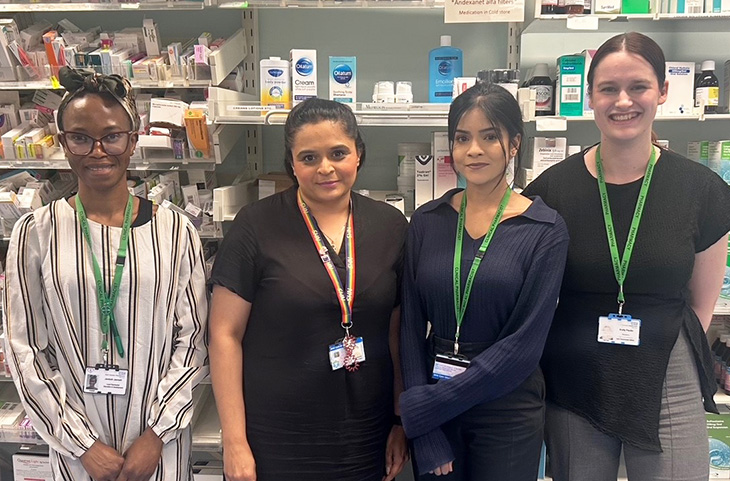As part of our programme to improve the quality and safety of our services and ensure they are delivered in a safe, smart and sustainable way, we are always looking for ways to improve productivity without any impact on and often with improvements in the quality of the care and services we provide.

Medicines represent our highest item of non-pay expenditure, with £48.2m spent on high-cost drugs in the last financial year. Given the logistical complexity of having medicines available and an often challenging funding mechanism, effective management of these resources is critical. The medicines value programme (MVP), led by pharmacy, has been a multi-year programme to do things differently.
The programme was established to ensure the efficient and effective use of high-cost drugs, benefiting both patients and the local health economy by supporting our aim to ensure services are clinically, operationally and financially sustainable. The programme’s focus has been on enhancing medicines management, medicines optimisation and improving population health outcomes. In 2024/25 the team leading the programme achieved £2.1m of financial improvement, and have achieved £3.7m overall since the programme started.
The initiative is driven by a dedicated transformation team led by MVP Pharmacist, Janki Patel. The team includes Rabeena Iruthayaraj and Jankeh Janneh, Lead Pharmacists for Specialist Medicine; and Molly Paulin, Pharmacy High-Cost Medicines and Procurement Supervisor. Together, they are working with clinical teams across the trust to achieve tangible improvements in medicines usage and patient care.
“To date the MVP has had a profound impact, driven by strategic investments in clinical pharmacy roles and pathway optimisation,” said Janki. “By aligning clinical objectives with financial objectives, the programme has not only delivered sustainable cost savings to the system, it has also enhanced patient care.”
Some of the key projects that the MVP team have initiated include biosimilar switching and dose banding.
“Biosimilar switching involves the transition from originator biologic medicines to ‘biosimilars’, which are more cost-effective alternatives, in a safe and effective manner,” explains Rabeena. “Once a drug reaches the end of its patent, alternative versions that do the same thing become available. We review the clinical data to support the safety and efficacy of biosimilars, ensure patients understand the reasons for switching and the potential benefits, such as cost savings, and explain that the switch will not compromise therapeutic outcomes.”
Patients are closely monitored for any adverse reactions or changes in therapeutic response post-switch, and any issues are promptly addressed by the clinical teams.
“Some patients have been reluctant to change, especially when they have been using a particular originator for some time and know that it works for them,” Rabeena continues. “While we know that the biosimilar will deliver the same benefit, we understand that it can be a daunting idea for some. We speak to patients to alleviate any concerns and provide reassurance, but most patients are more than willing to make the switch.”
Dose banding biological treatments improves patient safety, patient experience, and pharmacy workflow, and generates savings by using standardised ranges or bands of doses based on weight, body surface area, or other relevant patient factors. For example, where a patient’s weight indicates a dose of 315mg of a drug supplied in 100mg vials, standardising the dose means rounding the dose to 300mg with no effect on efficacy and preventing the wastage of the 85mg that would be left over if using a fourth 100mg vial.
“Dose banding streamlines preparation, administration, reduces medicines wastage, and ensures cost efficiency by dispensing pre-determined doses that meet patients’ needs,” says Janki. “The team has collaborated closely with clinicians and nurses of speciality teams to implement and monitor dose bands, ensuring safe and effective treatment across patient populations. Strong collaboration and active involvement of the specialist teams has been key to our success.”
The team provides support across the trust for those looking for guidance on how they can achieve the same efficiencies in their area.
“We want to support more teams to be able to make changes that help them become more efficient,” continues Janki. “We are really grateful to the gastroenterology, rheumatology, dermatology, neurology and ophthalmology teams we have worked with and we are confident that we can achieve further cost savings in other specialities, while continuing to improve patient care.”
Photo L-R: Jankeh Janneh, Lead Pharmacist for Specialist Medicine, Janki Patel, MVP Pharmacist, Rabeena Iruthayaraj, Lead Pharmacist for Specialist Medicine and Molly Paulin, Pharmacy High-Cost Medicines and Procurement Supervisor.
